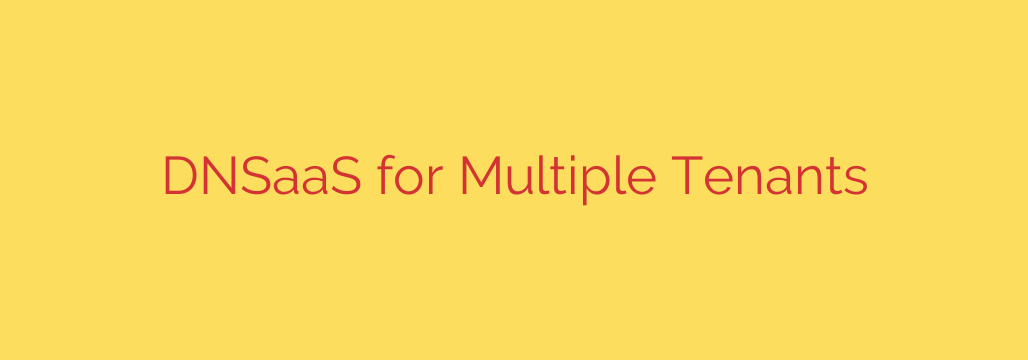
Scaling Your SaaS: The Ultimate Guide to Multi-Tenant DNS Management
As a SaaS platform grows, so does the complexity of its infrastructure. One of the most critical, yet often overlooked, challenges is managing DNS for a rapidly expanding customer base. When your service allows customers to use their own custom domains, you are suddenly responsible for a crucial piece of their online presence. This is where a robust multi-tenant DNS strategy becomes not just an advantage, but a necessity.
Handling DNS for hundreds or thousands of tenants manually is inefficient and prone to error. A single misconfiguration can lead to downtime for a customer, damaging trust and your brand’s reputation. The solution lies in adopting a DNS-as-a-Service (DNSaaS) model specifically designed for the unique demands of a multi-tenant environment.
The Core Challenge: Isolation and Scale
Standard DNS solutions are built for managing a handful of domains belonging to a single entity. A multi-tenant environment is fundamentally different. You’re not just managing your own DNS; you are managing DNS on behalf of your customers. This introduces two primary requirements:
- Isolation: Each tenant’s DNS configuration must be completely separate and secure from every other tenant. One customer should never have the ability to see or modify the DNS records of another.
- Scale: The system must be able to handle the addition, modification, and removal of countless domains and records programmatically, without manual intervention.
A proper multi-tenant DNS platform is architected from the ground up to address these needs, providing a secure and scalable foundation for your service.
Key Features of a Strong Multi-Tenant DNS Solution
When evaluating a DNS provider or building your own system, several features are non-negotiable for ensuring security, reliability, and a seamless customer experience.
Robust Security and Strict Tenant Isolation
This is the most critical requirement. A multi-tenant system must enforce strict boundaries between tenants. This means that API calls to modify records forcustomer-a.commust be completely unauthorized to touch records forcustomer-b.com. This is typically achieved through scoped API keys or tokens, where each key is tied to a single tenant account, preventing any risk of cross-customer data leakage or malicious configuration changes.Powerful Automation Through a Comprehensive API
At scale, manual DNS management is impossible. A powerful, well-documented API is essential for automating the entire lifecycle of customer DNS. Your platform should be able to programmatically create zones, add records (A, CNAME, MX, etc.), and delete configurations as customers onboard, change settings, or churn. An API-first approach drastically reduces operational overhead and eliminates human error.Effortless Scalability to Millions of Domains
Your DNS infrastructure should grow with you, not hold you back. A true multi-tenant DNS service is built to handle an enormous volume of zones and records without any degradation in performance. Whether you have ten customers or ten million, the system should respond with the same speed and reliability.High Performance and Unwavering Reliability
DNS is a foundational internet service; if it’s slow or unavailable, your customers’ services are effectively offline. Look for a provider that operates a global anycast network. An anycast network routes queries to the geographically closest server, which significantly reduces latency and improves load times for your customers’ end-users. This distributed infrastructure also provides incredible resilience against DDoS attacks and regional outages, ensuring maximum uptime.White-Labeling and Branding with Vanity Nameservers
Maintaining a consistent brand experience is vital. Forcing your customers to point their domains to generic nameservers (e.g.,ns1.dnsprovider.com) can dilute your brand. A key feature of a professional multi-tenant solution is the ability to use vanity nameservers. This allows you to offer branded nameservers likens1.your-saas.comandns2.your-saas.com, providing a more professional and trustworthy experience for your customers.
Actionable Security Tips for Implementation
As you implement your multi-tenant DNS strategy, prioritize security to protect both your platform and your customers.
- Enforce the Principle of Least Privilege: When generating API keys for your automation, ensure they have the minimum permissions necessary. An API key should be scoped to a single tenant and should only be able to perform required actions (e.g., create and update records), but not delete the entire zone.
- Securely Store and Manage API Credentials: Treat your DNS API keys like any other sensitive credential. Store them securely in a secret management system, rotate them regularly, and never expose them in client-side code.
- Monitor for Anomalous Activity: Keep logs of all DNS changes made via the API. Monitor these logs for unusual patterns, such as an abnormally high rate of changes for a single tenant, which could indicate a compromised account or a malfunctioning script.
Ultimately, choosing the right approach to DNS management is a foundational decision for any SaaS company. By prioritizing a secure, scalable, and API-driven multi-tenant DNS solution, you build a resilient infrastructure that enhances your customer experience, strengthens your brand, and enables your platform to grow without limits.
Source: https://www.linuxlinks.com/designate-multi-tenant-dnsaas-service/








